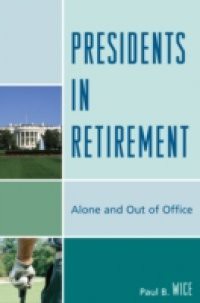Presidents in Retirement: Alone and Out of the Office describes and analyzes the behavior of those thirty-four former presidents who survived their terms and were faced with deciding how to make the most of their new lives as private citizens. Rather than simply present a chronology of presidential behavior, the book explores the variety of retirement activities with chapters on partisan politics, public service, economic pursuits, leisurely activities, health concerns, and relationships with a successor. The book's emphasis is on the range of social-psychological factors affecting the behavior of ex-presidents once they leave the White House. What did these once powerful men do to fill many empty hours of retirement? Why did they pursue particular avenues of endeavor, and to what degree did these choices provide satisfaction? What discernible patterns of behavior can be identified which can be of predictive value in understanding the retirement behavior of future presidents? This book offers a unique opportunity to examine the personality and beliefs of our presidents in a relatively pristine setting. The reader can observe these former chief executives without having to factor in the influence of advisors and staff. Retirement grants a personal freedom to engage in activities and express oneself without great concern with political repercussions. Additionally, once out of the White House, ex-presidents are no longer trapped by political crises which are likely to circumscribe their behavior. Retirement is therefore a time when a person can express true inner feelings and behave in a manner consistent with these beliefs. Freeing them from the dictates of a difficult job, retirement offers former presidents the freedom and enjoyment to live their final years in comfort and happiness or under stressful conditions caused by economic or health concerns. Although the step down from the presidency may be much greater than the average person's experiences of entering retirement, the relative problems and rewards are only of a qualitative difference.

